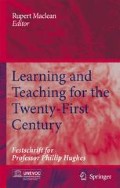Although Phil Hughes’ main areas of interest have not been directly related to international education per se, he is indisputably an internationalist with wide experience of education systems in many countries. Moreover, his involvement with the UNESCO implementation of the Delors (1998) report (which I had the pleasure of discussing with him on more than one occasion in Paris in the late 1990s) drew him even closer to the field – the four pillars of the Delors Report encourage national systems to recognise the interdependence of the world and its cultures as they shape their curricula. In some ways this report was an up-to-date and freshly cast reaffirmation of the UNESCO 1974 aims of international education for member states. National and international education agendas are merging. Hughes has made many statements about teaching, learning, curriculum development, and student assessment which have very close affinities with international education and the major premises on which it is based. A number of such references therefore appear in this chapter as a tribute to Hughes’ contribution (perhaps even unwittingly) to this emerging field, and as reassurance for those of us embedded in it, that international education is on the right track.
Access this chapter
Tax calculation will be finalised at checkout
Purchases are for personal use only
Preview
Unable to display preview. Download preview PDF.
References
In the following references “IBO” means International Baccalaureate Organization. Information about the IBO and its programmes is available at www.ibo.org.
Bruner, J. (1967). Studies in Cognitive Growth. Wiley: New York.
Delors, J. (1998). Learning: The Treasure Within, 2nd ed. UNESCO: Paris.
European Council of International Schools (2003). Schools Directory 2003/4. John Catt Educational: Glasgow.
Friedman, T. (2005). The World is Flat: A Brief History of the Globalized World in the 21st Century. Penguin/Allen Lane: London.
Gardner, H. (1993). Frames of Mind: The Theory of Multiple Intelligences, 2nd ed. Fontana: London.
Gardner, H. (1999). Intelligence Reframed: Multiple Intelligences for the 21st Century. Basic Books: New York.
Hayden, M., and C. Wong (1997). The international baccalaureate: international education and cultural preservation. Educational Studies 23(3): 349–361.
Heyward, M. (2002). From international to intercultural: redefining the international school for a globalized world. Journal of Research in International Education 1(1): 9–32.
Hinrichs, J. (2001). Effects of the international baccalaureate program on international understanding. Thesis in partial fulfilment of a Ph.D. Berne University: Switzerland.
Hughes, P. (1995). Internationalisation of education and curricula for the twenty-first century. Education Research and Perspectives 22(2): 1–16.
Hughes, P. (1998). Goals, expectations and realities for young people: issues for education in the twenty-first century. In: Education for the Twenty-First Century: Issues and Prospects. UNESCO: Paris, pp. 47–60.
Hughes, P. (2001a). Curriculum reforms in general secondary education. Keynote paper at the KICE (Korea Institute of Curriculum and Evaluation)-UNESCO conference, Seoul.
Hughes, P. (2001b) Secondary education reform: issues for the Asia-Pacific region. Prospects n117 v XXXI, n1, March, pp. 103–114.
Hughes, P. (2003). Things that last–continuity and change. Inaugural Phillip Hughes Oration. Occasional Paper: Australian College of Education, Canberra.
Hughes, P. (2004). How do teachers influence people? A study of the effects of teachers on some prominent Australians. Australian College of Education Refereed Paper No.33, Canberra.
Hughes, P. (2005a). The curriculum: let’s mend what needs fixing. International Networking for Educational Transformation. Online Conference Series 2. Web reference www.sst-inet.net/olc.
Hughes, P. (2005b). Why access to TVET for all is essential if education for all is to be achieved. Prospects XXXV, n3, September, pp. 253–267.
Hugo, V. (1843). Preface to Les Burgraves –trilogie. Paris: E. Michaud [original edition].
IBO (1999a). Diploma Programme: Language A1. IBO: Geneva.
IBO (1999b). Diploma Programme: Theory of Knowledge. IBO: Geneva.
IBO (2000). Middle Years Programme: Arts. IBO: Geneva.
IBO (2001a). Diploma Programme: History. IBO: Geneva.
IBO (2001b). Diploma Programme: Environmental Systems. IBO: Geneva.
IBO (2002a). A basis for practice: the Middle Years Programme. IBO: Geneva.
IBO (2002b). A basis for practice: the Primary Years Programme. IBO: Geneva.
IBO (2004). Diploma Programme: Mathematics Higher Level. IBO: Geneva.
Leach, R. (1969). International Schools and Their Role in the Field of International Education. Pergamon Press: New York.
Maclean, R. (2001). Overview: secondary education at the crossroads. Prospects 31(1): 39–45.
Miller, R. (1991). Introduction. In: R. Miller (ed.) New Directions in Education: Selections from Holistic Education Review. Holistic Education Press: Brandon, VT, pp. 1–3.
Oxfam (1997). A Curriculum for Global Citizenship. Oxfam: UK.
Rischard, J. (2002). High Noon: 20 Global Problems, 20 Years to Solve Them. Basic Books: New York.
Ridderstrale, J., and K. Nordström (2000). Funky Business. Prentice-Hall: London.
UNESCO (1974). Recommendation on Education for International Understanding. UNESCO : Paris.
UNESCO (1996). Declaration and Integrated Framework of Action on Education for Peace, Human Rights and Democracy. UNESCO: Paris.
UNESCO (2002). Enhancing Global Sustainability. (Position paper and proposals by UNESCO, Preparatory Committee for the World Summit on Sustainable Development 3rd Session New York). UNESCO: Paris.
Vygotsky, L. (1986). Thought and Language. MIT Press: Cambridge.
Author information
Authors and Affiliations
Editor information
Editors and Affiliations
Rights and permissions
Copyright information
© 2007 Springer Science+Business Media, LLC
About this chapter
Cite this chapter
Hill, I. (2007). A Pedagogy for International Education. In: Maclean, R. (eds) Learning and Teaching for the Twenty-First Century. Springer, Dordrecht. https://doi.org/10.1007/978-1-4020-5773-1_3
Download citation
DOI: https://doi.org/10.1007/978-1-4020-5773-1_3
Publisher Name: Springer, Dordrecht
Print ISBN: 978-1-4020-5772-4
Online ISBN: 978-1-4020-5773-1
eBook Packages: Humanities, Social Sciences and LawEducation (R0)

